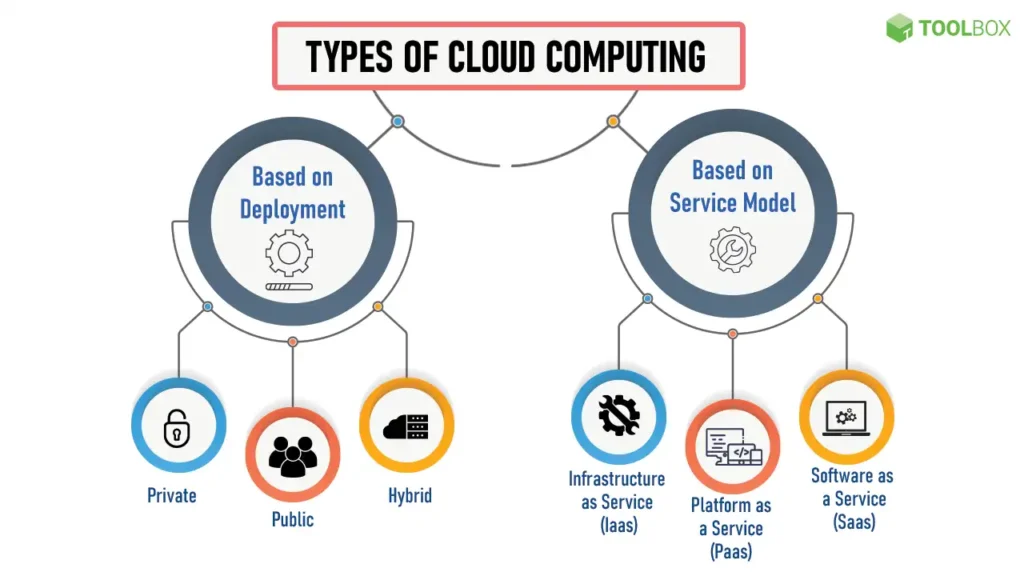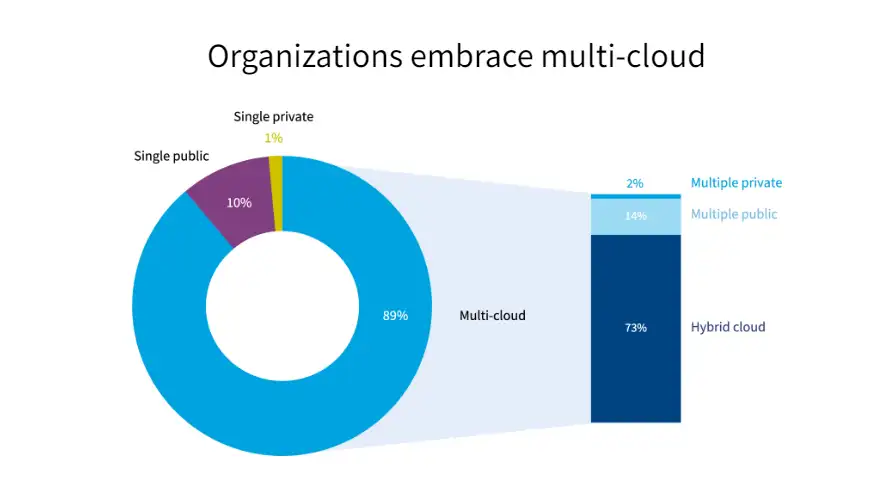Have you ever experienced the frustration of losing crucial data due to a hardware failure or a sudden power outage? This scenario highlights a significant pain point for many businesses: data loss and downtime.
Such incidents can cause severe disruptions, financial losses and damage your company’s reputation. In fact, research proves that large-scale data loss (100+ million records) costs between $5 million and $15.6 million. Some businesses never bounce back from data loss of this magnitude. Traditional IT infrastructure, with its reliance on physical hardware and localized data storage, is prone to these vulnerabilities.
The solution to these problems lies in cloud computing.
As Brian Leger, Co-Founder of InfoTECH Solutions, says, “Embracing cloud computing is not just about keeping up with technology trends; it’s about future-proofing your business and positioning it for sustainable growth.”
This blog explores the importance of cloud computing for your business and how it can help you overcome these challenges.
Why Cloud Computing is Important
Cloud computing has revolutionized businesses by providing flexible, scalable, and cost-effective solutions. Its importance cannot be overstated, as it addresses several key areas critical for business success.
1. Enhanced Data Storage and Accessibility
One of the most significant advantages of cloud computing is its ability to offer robust data storage solutions. By 2025, an estimated 200 zettabytes (ZB) of data will be stored in the cloud, highlighting the massive shift towards cloud environments for data management.
Unlike traditional data centers, cloud environments allow businesses to store vast amounts of data without needing physical space.
This flexibility ensures your business can grow without worrying about data storage limitations. Additionally, cloud-based applications enable real-time access to data from any location with an internet connection.
This level of accessibility enhances collaboration and productivity, allowing employees to work remotely or from multiple locations seamlessly.
2. Cost Savings and Efficiency
Cloud computing service models, such as Infrastructure as a Service (IaaS), Platform as a Service (PaaS), and Software as a Service (SaaS), offer significant cost savings compared to traditional IT infrastructure.
By leveraging cloud technology, businesses can reduce their reliance on expensive hardware and software. Instead, they can pay for the computing resources they need on a subscription basis, which helps in optimizing their IT budgets. The shift to cloud services also reduces the need for on-site maintenance and support, lowering operational costs.
3. Improved Disaster Recovery and Business Continuity
Disaster recovery is a critical aspect of any business continuity plan. Traditional methods often involve complex and costly solutions. Cloud computing simplifies this process by providing robust disaster recovery options.
Cloud service providers offer automated backups and redundant systems that ensure data integrity and availability even during a disaster.
This means that your business can quickly recover from disruptions and maintain continuity, minimizing downtime and its associated costs.
4. Scalability and Flexibility
As businesses grow, their IT needs evolve. Cloud computing provides the scalability required to meet these changing demands.
With cloud services, businesses can easily scale their computing resources up or down based on their current needs. Due to this convenience, more than 93% of organizations are considering or have already adopted cloud services to improve outsourcing.
This flexibility ensures that you do not overpay for unused resources or struggle with insufficient capacity during peak times. Cloud infrastructure allows for rapidly deploying new services and applications, enabling businesses to stay agile and competitive.
Key Cloud Computing Service Models
Understanding the different cloud computing service models is essential for leveraging the full potential of cloud technology. Here are the primary models:
Infrastructure as a Service (IaaS): IaaS provides virtualized computing resources over the internet. It eliminates the need for businesses to invest in physical hardware, offering flexibility and scalability. Businesses can manage their operating systems, applications, and data while the service provider handles the underlying infrastructure.
Platform as a Service (PaaS): PaaS delivers a platform that allows businesses to develop, run, and manage applications without dealing with the underlying infrastructure. This model is ideal for developers as it provides the tools and frameworks for efficient application development.
Software as a Service (SaaS): SaaS offers software applications over the Internet on a subscription basis. This model eliminates the need for businesses to install and maintain software on their local devices. Examples of SaaS applications include email services, customer relationship management (CRM) systems, and collaboration tools.

Source: Spiceworks
Choosing the Right Deployment Model
In addition to the service models, businesses must choose the appropriate deployment model based on their specific needs. The main deployment models are:
- Public Cloud: Services are provided over the public internet and shared among multiple organizations. This model offers cost savings and scalability but may have security and compliance considerations.
- Private Cloud: Services are dedicated to a single organization and hosted on-premises or by a third-party provider. This model offers enhanced security and control but can be more expensive.
- Hybrid Cloud: Combines public and private cloud elements, allowing businesses to leverage the benefits of both. This model provides flexibility and scalability while addressing security and compliance requirements. Flexera’s 2024 State of the Cloud Report, 73% of companies opt for a hybrid cloud.

Source: Flexera
Comparison of Cloud Service Providers
| Feature/Service | AWS | Microsoft Azure | Google Cloud Platform (GCP) |
| Market Share | Leading provider | Second largest | Rapidly growing third |
| Pricing Model | Pay-as-you-go, Reserved Instances | Pay-as-you-go, Reserved Instances | Pay-as-you-go, Sustained Use Discounts |
| Compute Services | EC2, Lambda | Virtual Machines, Functions | Compute Engine, Cloud Functions |
| Storage Solutions | S3, EBS | Blob Storage, Disk Storage | Cloud Storage, Persistent Disk |
| AI and Machine Learning | SageMaker | Azure Machine Learning | AI Platform, TensorFlow |
| Database Services | RDS, DynamoDB | SQL Database, Cosmos DB | Cloud SQL, Bigtable |
| Global Presence | 25 regions, 81 availability zones | 60+ regions | 25 regions, 73 availability zones |
| Security and Compliance | Comprehensive, HIPAA, GDPR | Comprehensive, HIPAA, GDPR | Comprehensive, HIPAA, GDPR |
| Support and Documentation | Extensive documentation, 24/7 support | Extensive documentation, 24/7 support | Extensive documentation, 24/7 support |
Maximizing the Benefits of Cloud Computing
To maximize the benefits of cloud computing, businesses should consider the following best practices:
- Assess Your Needs: Conduct a thorough assessment of your current IT infrastructure and identify areas where cloud computing can provide the most value.
- Choose the Right Provider: According to research from CloudSecureTech, there are more than 40,000 managed services providers, and growing. Select a reputable provider that offers the necessary features, security measures, and support for your business needs.
- Plan for Migration: Develop a detailed migration plan to ensure a smooth transition to the cloud. This plan should include data transfer, application compatibility, and employee training.
- Implement Strong Security Measures: Protect your data and applications by implementing robust security measures such as encryption, access controls, and regular security audits.
- Monitor and Optimize: Continuously monitor your cloud environment to identify areas for optimization and cost savings. Use analytics tools to gain insights into resource usage and performance.
Elevate Your Business with InfoTECH Solutions’ Cloud Expertise
Navigating the complexities of modern business requires robust and flexible IT solutions. Cloud computing offers businesses a way to enhance their operational efficiency, improve collaboration, and stay competitive in an increasingly digital world.
InfoTECH Solutions specializes in helping businesses transition seamlessly to the cloud. From cloud migration to ongoing management, we ensure your cloud environment is secure, efficient, and tailored to your needs.
Contact us today to schedule a free consultation and discover how our cloud services can transform your business.



